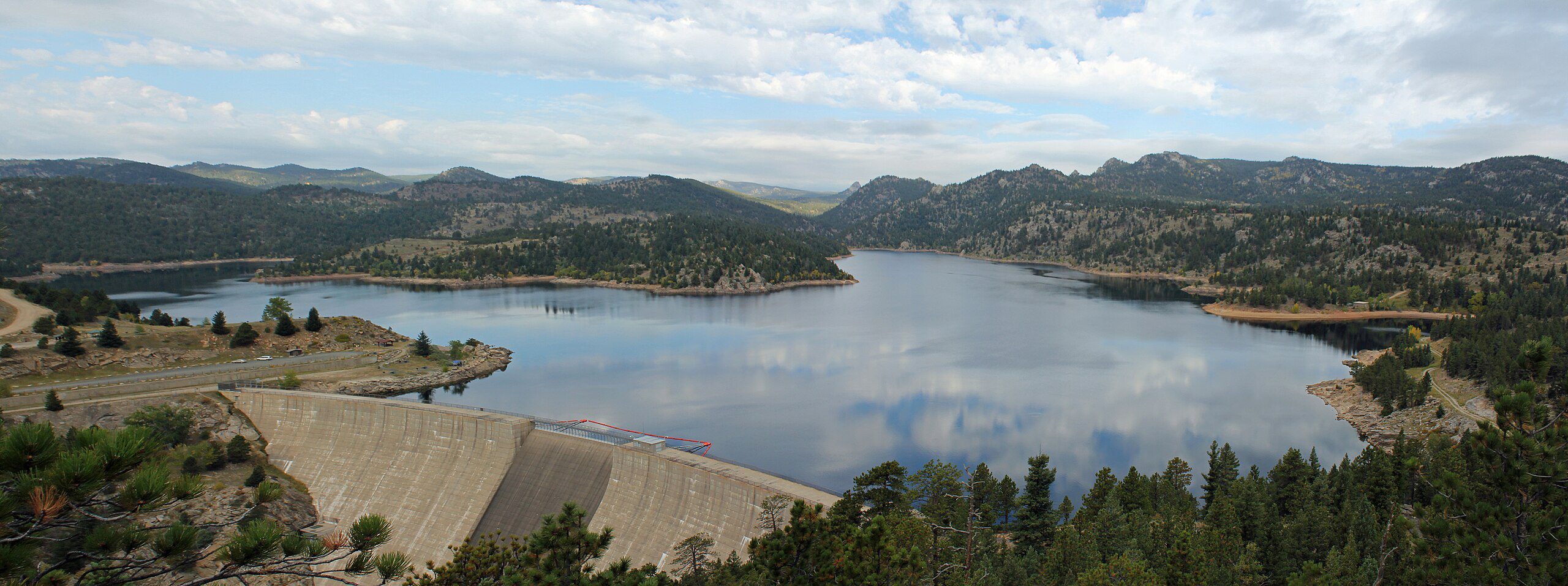- A federal judge ordered construction on Gross Reservoir to stop.
- The ruling vacated key permits, citing serious environmental flaws.
- Denver Water says the project is 60% complete and critical to water security.
- A permanent injunction bans enlargement of the reservoir itself.
- A hearing will determine what safety work may proceed on the dam.
Thursday, April 10, 2025 — A long-contested water infrastructure project hit a major roadblock last week when a federal court ordered construction on the expansion of Gross Reservoir to stop immediately, citing serious violations of environmental law. U.S. District Judge Christine M. Arguello’s April 3 order vacates the U.S. Army Corps of Engineers’ permit for the project and imposes a preliminary injunction on further dam construction, pending a safety hearing. It also issues a permanent ban on enlarging the reservoir.
vacates the U.S. Army Corps of Engineers’ permit for the project and imposes a preliminary injunction on further dam construction, pending a safety hearing. It also issues a permanent ban on enlarging the reservoir.
Denver Water, which serves 1.5 million people in the metro area, called the ruling “a radical remedy” and announced plans to appeal.
“It’s impossible to reconcile the judge’s order with what is clearly in the broader public interest,” Denver Water said in an April 4 press release . “We plan to appeal and seek an immediate stay of this order that leaves a critical project that is 60% complete on hold and puts at risk our ability to efficiently provide a safe, secure and reliable water supply.”
. “We plan to appeal and seek an immediate stay of this order that leaves a critical project that is 60% complete on hold and puts at risk our ability to efficiently provide a safe, secure and reliable water supply.”
Temporary Stay Granted.
In a slight reprieve for the utility, Judge Arguello granted a 14-day stay of the order on April 6, 2025. The temporary pause allows Denver Water to maintain its current posture and prepare for the upcoming hearing, while halting any additional construction activity.
“Denver Water will abide by the judge’s order and temporarily halt construction on the dam pending a hearing with the judge and will rapidly appeal the decision,” the utility stated .
.
Serious Environmental Deficiencies.
The court’s decision stems from a 2024 ruling that found the Corps violated multiple federal laws—including the Clean Water Act (CWA), National Environmental Policy Act (NEPA), and Administrative Procedure Act (APA)—when it issued a dredge-and-fill permit for the dam expansion, part of Denver Water’s Moffat Collection System Project.
Judge Arguello concluded that the Corps had failed to properly define the project’s purpose, inadequately considered viable alternatives, used an unsupported cost analysis, and neglected to quantify climate change impacts on water supply reliability. In her ruling, she wrote that “the Corps’ violations were serious and will necessitate” a redefinition of the project purpose and a full reassessment of environmental alternatives.
The court determined that the deficiencies “are not of the type that can simply be supported by better reasoning,” concluding that the Corps must “start over and develop a reasonable cost analysis” and undertake a more rigorous climate impact review.
Construction on Hold, Project in Limbo.
The immediate consequence of the order is a freeze on dam construction, with a hearing set to determine whether any additional work is needed to stabilize the partially completed structure. Denver Water had planned to resume construction on April 10, including completing the final portion of the dam raise this year.
According to Denver Water, halting the work midstream creates both safety and operational concerns.
“The original gravity dam has been deconstructed and its foundation excavated, exposing steep rock slopes that depend on bolts to temporarily shore them up,” the utility stated. “Timely completion of the dam raise is necessary to permanently stabilize and support those surfaces.”
Denver Water also warned of workforce and economic impacts, noting that hundreds of specialized workers may lose their jobs due to the order.
Reservoir Enlargement Permanently Blocked.
The court went further, issuing a permanent injunction against enlarging the reservoir. This includes prohibitions on tree removal, wildlife disruption, and water diversions. Judge Arguello cited “irreparable environmental injury” that cannot be adequately addressed through monetary damages, emphasizing that public comments and environmental agency warnings were largely ignored in the permitting process.
“Environmental harm that will occur as a result of the Gross Reservoir enlargement is indisputable and irreparable,” the order states.
Denver Water has argued that the project is necessary for long-term resilience, especially given climate variability, wildfire threats, and historical drought conditions. But the court was not persuaded that urgency justified skipping key environmental review steps.
Long Road Ahead.
The Gross Reservoir Expansion Project has been in the works since 2002 and was approved by the Federal Energy Regulatory Commission (FERC) in 2017. Construction began in 2022, with a completion deadline of 2027.
Despite the setback, Denver Water emphasized its commitment to the project. “Denver Water will do everything in its power to see this project through to completion,” the utility said.
The court’s next step is a hearing to evaluate whether any limited construction should proceed to ensure the structural safety of the partly built dam. Dates have been set between April 22 and May 14 for the proceedings.
Until then, all eyes will be on the federal courtroom as the future of one of Colorado’s most ambitious water projects hangs in the balance.
Image:
Gross Reservoir in Boulder County, Colorado , September 2014 by Jeffrey Beall. Licensed under the Creative Commons Attribution 3.0 Unported license.
, September 2014 by Jeffrey Beall. Licensed under the Creative Commons Attribution 3.0 Unported license.






Leave a Reply